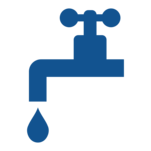
The application period for the Low Income Household Water Assistance Program (LIHWAP) is open.
The program provides assistance to low-income households to reduce balances on their residential water and wastewater bills.
The assistance can be used to restore services, avoid service disruption, or support residential customers in danger of falling behind on their bills in the near future.
Residents can apply online through the DCAid application portal.
|

Monkeypox (hMPXV) is a disease that can affect anyone, regardless of gender or sexual orientation. The virus can cause flu-like symptoms, swollen lymph nodes, and rash. Monkeypox (hMPXV) can spread to any individual from anyone who has the virus through direct contact with rashes or scabs, respiratory droplets from face-to-face interactions, or close, intimate contact.
There is a limited supply of the JYNNEOS monkeypox (hMPXV) vaccine in New Jersey. Monkeypox (hMPXV) vaccinations are provided to eligible residents at no charge to the individual. Anyone with a known exposure within the past 14 days should contact their health care provider or local health department regarding testing and vaccine eligibility. Local health departments will conduct contact tracing and offer the vaccine to anyone identified as a close contact.
For residents with known exposure to a person with monkeypox (hMPXV), the two-dose regimen of the monkeypox (hMPXV) vaccine for Post-Exposure Prophylaxis (PEP) is available through their local health department.
For those without a confirmed exposure who believe they may have been exposed or are at high risk for having been exposed to monkeypox (hMPXV), the vaccine is available through community vaccination sites.
Residents are eligible to receive a vaccine at community sites if they meet one of the following criteria:
- People who attended an event where known monkeypox (hMPXV) exposure occurred within the past 14 days
- People who had multiple sexual partners in the past 14 days in areas where monkeypox (hMPXV) has been reported
Vaccination is available for eligible residents at selected locations by appointment only.
Want to learn the facts about monkeypox (hMPXV), its symptoms, how it spreads, testing, and vaccinations from experts? Watch this webinar from the Department of Health.
|
Find Vaccine and Testing Locations Near You

Everyone 12 or older can receive the COVID-19 vaccine for free. COVID-19 vaccines are safe and highly effective at preventing you from getting sick.
Testing is available to everyone in New Jersey. It is quick and easy. You don’t need insurance and free testing is available.
|

A second Pfizer or Moderna booster dose has been approved for people aged 50+, people aged 12+ who are immunocompromised, and people aged 18+ who have only received the J&J vaccine.
This week, the CDC updated recommendations for booster shots to allow certain immunocompromised individuals and people over the age of 50 who received a previous booster dose at least 4 months ago to be eligible for another Pfizer or Moderna booster dose.
- Individuals aged 50 and older who received a previous booster dose of Pfizer or Moderna at least four months ago are eligible for an additional booster dose of Pfizer or Moderna.
- Individuals aged 12 and older who are moderately to severely immunocompromised who received a previous booster dose of Pfizer or Moderna at least four months ago are eligible for a second booster dose of Pfizer or Moderna.
- Individuals aged 18 and older who received a primary dose and a previous booster dose of the Johnson & Johnson vaccine at least four months ago are eligible for an additional booster dose of Pfizer or Moderna.
Schedule your booster today at covid19.nj.gov/finder or call 855-568-0545.
|

Docket is a mobile app that makes it easier for you and your family to securely access your COVID-19 vaccination record.
If you don't have your vaccination card with you or have lost it, you can easily access your record through the app to provide proof of COVID-19 vaccination, as needed.
The Docket app is now available in the App Store or on Google Play.
|

In addition to the hundreds of testing locations available across the state, there are now expanded free testing options available for New Jerseyans:
It's especially important to get tested if you have COVID-19 symptoms after being exposed, or have been in close contact with someone who tested positive for COVID-19. You should also get tested if you were recently at a large gathering where social distancing was hard to maintain and are not fully vaccinated or recently recovered, or if you must travel and are not fully vaccinated.
|
|
 |
NJ COVID-19 Updates and More
Do you have questions about when and where you can receive the COVID-19 vaccine, mask requirements, or how to get a COVID-19 test? The State of New Jersey offers up-to-date information, resources, and guidance at our COVID-19 Information Hub.

New Jersey’s Eviction Prevention Program will pay up to two years of rent arrears and future rent, as well as utility assistance, for low-, moderate-, and middle-income households that have experienced an economic impact due to the COVID-19 pandemic. The Eviction Prevention Program uses the same application process as the COVID-19 Emergency Rental Assistance Program, which began in March 2021 and is still accepting applications. Landlords may apply for assistance on behalf of a tenant. Visit https://njdca.onlinepha.com/ to get started.
In addition to the COVID-19 Emergency Rental Assistance Program and Eviction Prevention Program, the State introduced critical eviction protections for renter households that have experienced economic hardships during the pandemic. To find out more about current eviction protections available and how to self-certify for these protections, visit https://covid19.nj.gov/renter.
|
|

We’ve all endured a lot since the start of this pandemic. During Suicide Prevention Month, remember: you are not alone.
The NJ MentalHealthCares Help Line offers counseling, emotional support, information, and assistance in helping to get behavioral health services needed by you or a loved one. Call 866-202-HELP (4357) or text “NJHOPE” to 51684.
Those who may be having suicidal thoughts can call the NJ Hopeline at 1-855-654-6735.
A free emotional support video helpline has been created to help deaf and hard of hearing New Jerseyans feeling the strain from the public health crisis. The helpline can be reached at 973-870-0677.
|

New Jersey retail stores, grocery stores, and food service businesses may no longer provide or sell single-use plastic carryout bags and polystyrene foam food service products. Single-use paper carryout bags are allowed to be provided or sold, except by grocery stores equal to or larger than 2,500 square feet, which may only provide or sell reusable carryout bags.
To learn more about the new law, visit Get Past Plastic.

Spring is in the air, but so are pollutants. Elderly people, people with respiratory ailments, and some other groups can be heavily impacted by air quality, which varies from day to day. The New Jersey Air Quality Flag Program uses brightly colored flags that correspond to the U.S. Environmental Protection Agency's Air Quality Index to communicate air quality in your community. By signing up for program alerts, you can help communicate air quality in your neighborhood.
Schools, senior centers, summer camps, and day care centers are among the organizations eligible for free flags, but anyone can participate in the program.

Have you recently lost your job and are struggling to pay your bills while searching for a new position? Unemployment Insurance (UI) provides temporary financial support to people who lose their jobs through no fault of their own. If you find yourself in this situation, you will want to visit the new, simplified unemployment application, available online from the Department of Labor.
|
|
|
Social Services for the Homeless (SSH)

The Social Service for the Homeless (SSH) program assists families and individuals who are experiencing homelessness or are at imminent risk of becoming homeless, but are not eligible for welfare (usually because their income is too high) and so are not eligible for Emergency Assistance.
The program provides emergency food, emergency shelter and payment of security or utility deposits as well as back rent, mortgage and utilities costs. These services, which are available on a 24-hour emergency basis, also include referral services and limited case management.
New Jersey residents experiencing homelessness can now call 2-1-1 for help.
2-1-1 community resource specialists are available 24 hours a day, 7 days a week and can help clients who speak many different languages. Information provided will be kept confidential, except for information that needs to be shared with providers involved in providing shelter or shelter-related services.
